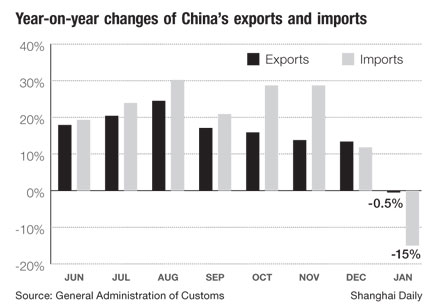Jolting trade report shows drops in imports, exports
 0 Comment(s)
0 Comment(s) Print
Print E-mail Shanghai Daily, February 13, 2012
E-mail Shanghai Daily, February 13, 2012

China's trade suffered a strong setback in January as both exports and imports dropped amid shrinking external demand and a slowing domestic economy.
The Spring Festival holiday, which distorted the usual working days, also contributed to the decline last month. But that didn't change the broad picture of China's weakening trade, analysts said.
Exports in January retreated 0.5 percent from a year earlier to US$149.9 billion, the first drop since November of 2009, the General Administration of Customs said yesterday. Imports lost an even bigger share of 15 percent year on year to US$122.7 billion, compared with growth of 11.8 percent in December.
Mainly due to weak imports and a low comparative base, China's trade surplus tripled from a year earlier to US$27.2 billion last month. "The sharp change is a result of the Spring Festival, which reduced the working days to only 17 days last month, four days less than a year earlier," the customs office said in a statement.
Taking seasonal factors into consideration, the bureau calculated that China's exports de facto expanded 10.3 percent and imports edged up 1.5 percent.
However, such adjusted data did not pacify worries among economists and market watchers.
"China's worse-than-expected imports reflected the rather weak domestic demand," said Zhou Hao, an economist at Australia and New Zealand Banking Group. "Given higher fuel costs in China starting this month and diminishing hope of more aggressive easing policies, the outlook for China's manufacturing is dim. It thus makes the country's trade prospects gloomy, as well."
China's Consumer Price Index, the main gauge of inflation, rebounded unexpectedly to 4.5 percent annually in January, halting a five-month downward trend and denting hopes of more easing policies immediately.
"Such performance of trade may invite more consideration of policy moves," said Tang Jianwei, an analyst at the Bank of Communications.
Commerce Minister Chen Deming said on Thursday that China will continue to support exporters through providing tax incentives, as the January trade data "can hardly make us optimistic."
The International Monetary Fund warned on Monday that China's economic growth could be almost halved if Europe's economy experiences a sharp downturn.
But there is optimism.
Chang Jian, an economist at Barclays Capital, expected a rebound in trade growth this month because there won't be as much distortion as in January.
"The average January-February data to be released next month will help us to get a more accurate picture," Chang said.
The debt crisis in the eurozone continued to take a toll on bilateral trade between China and the European Union, which slumped 7.1 percent from a year earlier to US$42.6 billion. Trade with the United States dropped 3.9 percent to US$35.4 billion.
In comparison, emerging markets demonstrated resilient dynamism in doing business with China. Bilateral trade with Russia expanded 26.8 percent to US$7.1 billion, while shipments with Brazil increased 5.7 percent to US$6.3 billion.
Shanghai's trade decreased 9.7 percent on an annual basis to US$31.7 billion last month, coming only after Guangdong and Jiangsu provinces in terms of trade value, the Customs said.






Go to Forum >>0 Comment(s)